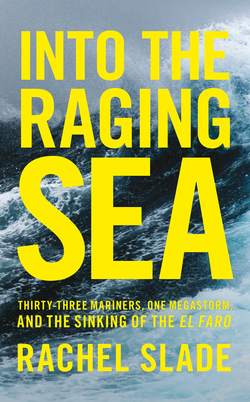Читать книгу Into the Raging Sea: Thirty-three mariners, one megastorm and the sinking of El Faro - Rachel Slade, Rachel Slade - Страница 12
CHAPTER 1 THE CLOCK IS TICKING
ОглавлениеThe satellite call came into the emergency center at 7:08 on the morning of October 1, 2015.
OPERATOR: Okay, sir.
CALLER: Are you connecting me through to a QI [Qualified Individual]?
OPERATOR: That’s what I’m getting ready now. We’re seeing who is on call and I’m going to get you right to them. Give me one second, sir. I’m going to put you on a quick hold. So one moment, please. Okay, sir. I just need your name please.
CALLER: Yes, ma’am. My name is Michael Davidson. Michael C. Davidson.
OPERATOR: Your rank?
CALLER: Ship’s master.
OPERATOR: Okay. Thank you. Ship’s name?
CALLER: El Faro.
OPERATOR: Spell that E-L …
CALLER: Oh man, the clock is ticking. Can I please speak to a QI? El Faro: Echo, Lima, Space, Foxtrot, Alpha, Romeo, Oscar. El Faro.
OPERATOR: Okay, and in case I lose you, what is your phone number please?
CALLER: Phone number 870-773-206528.
OPERATOR: Got it. Again, I’m going to get you reached right now. One moment please.
CALLER: [Aside.] And Mate, what else to do you see down there? What else do you see?
OPERATOR: I’m going to connect you now okay.
OPERATOR 2: Hi, good morning. My name is Sherida. Just give me one moment. I’m going to try to connect you now. Okay, Mr. Davidson?
CALLER: Okay.
OPERATOR 2: Okay, one moment please. Thank you for waiting.
CALLER: Oh God.
OPERATOR 2: Just briefly what is your problem you’re having?
CALLER: I have a marine emergency and I would like to speak to a QI. We had a hull breach, a scuttle blew open during a storm. We have water down in three-hold with a heavy list. We’ve lost the main propulsion unit, the engineers cannot get it going. Can I speak to a QI please?
OPERATOR 2: Yes, thank you so much, one moment.
Thirty-three minutes later, the American government’s network of hydrophones in the Atlantic Ocean picked up an enormous thud just beyond Crooked Island in the Bahamas. It was a sound rarely heard out there in the deepest part of the sea where, for decades, the government had been recording an endless underwater symphony. Three miles down, they listened to the lonely cries of humpback whales, the eerie hum of earthquakes, and the whirr of submarine propellers. Just white noise, really. But that morning, something huge and audible hit the ocean floor with terrific force.
Based on the positions of the hydrophones, the people listening knew approximately where the object landed. They also knew the precise moment that it hit. But what was it?
That the Americans had been listening in on the ocean since the 1960s was no secret, at least not to mariners. Some older guys remembered laying down the cable decades ago to feed this equipment, which served as the country’s first line of defense against submarine invasion or other nefarious activity on the high seas.
The precise locations within this network were considered classified, but one monitoring station, known as the Atlantic Undersea Test and Evaluation Center (AUTEC), occupies a piece of Andros Island in the Bahamas, just west of Nassau. The thud was notable enough that there was talk among a few members of the armed forces stationed there. That intel simmered among a handful of officers assigned to monitor maritime activity in the Caribbean.
When word got out that a large American container ship had vanished in Hurricane Joaquin somewhere east of the Bahamas, those stationed on Andros Island knew exactly what they’d heard. It was the sound of El Faro colliding with the ocean floor.
